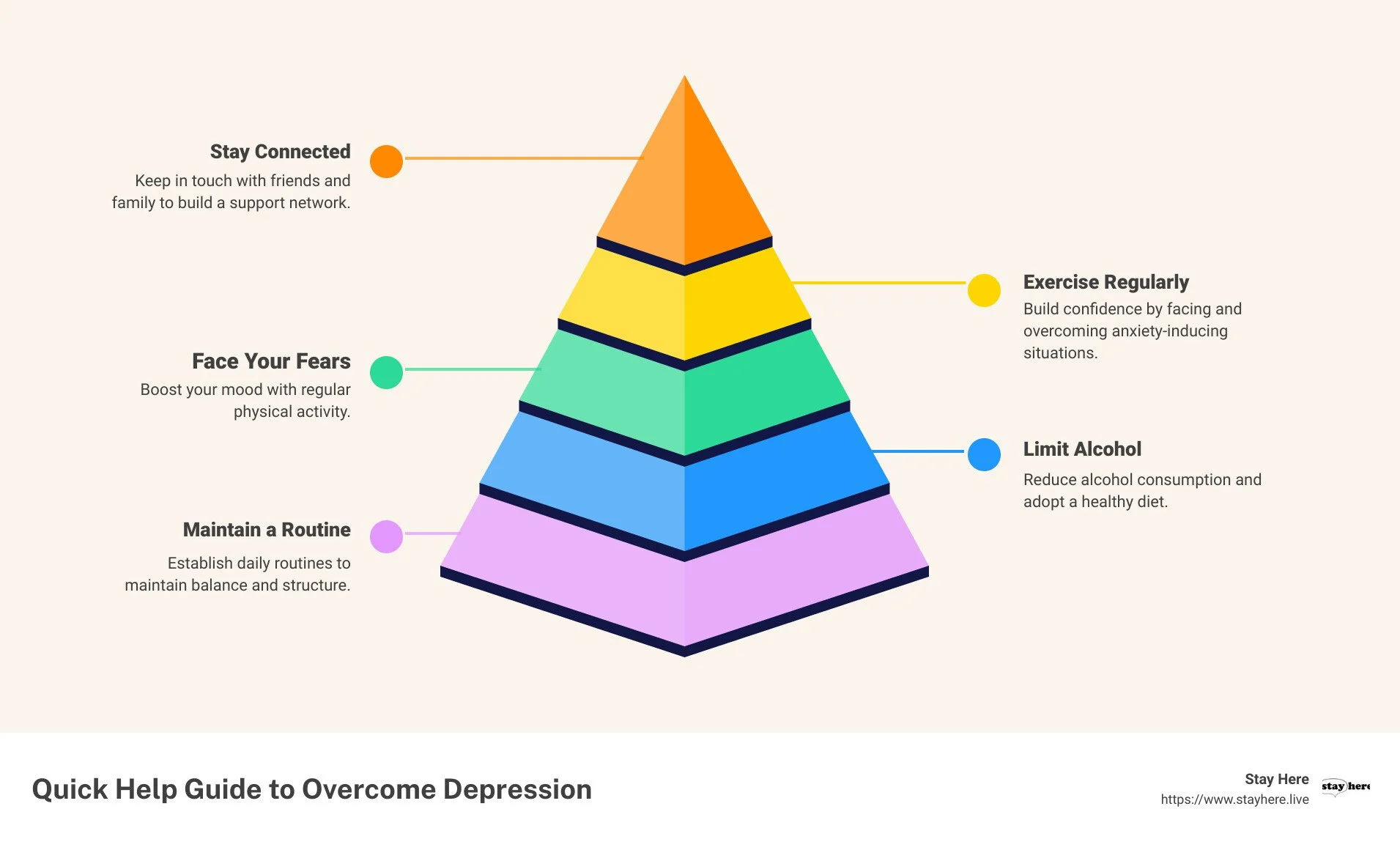How to Cope With Depression: Tips and Strategies
Image Alt Text: hope and healing - how to over come depression
Coping With Depression: Effective Tips and Strategies
When it comes to how to overcome depression, immediate steps can make a big difference. Here’s a quick guide:
Stay connected with friends and family.
Exercise regularly to boost your mood.
Face your fears, don’t avoid them.
Limit alcohol and eat a healthy diet.
Maintain a routine to keep balanced.
Depression is more than feeling sad; it's a serious mood disorder that affects your entire life. If untreated, it can persist and worsen. Understanding how to cope with depression is crucial for your mental health. Let's begin by acknowledging that it’s a treatable condition, not a character flaw or personal failure.
Implementing routines, reaching out for support, and making lifestyle changes are proven strategies to manage depression. These steps are foundational to building a healthier mindset.
I’m Jacob Coyne, a mental health advocate and founder of Stay Here. My mission is to provide hope and practical strategies for overcoming depression and suicidal thoughts. Stay with us as we dive deeper into these essential coping strategies.
Image Alt Text: quick-help-guide-to-overcome-depression - how to over come depression infographic pyramid-hierarchy-5-steps
Understanding Depression
Depression is a complex mood disorder that affects how you feel, think, and manage daily activities. It can make you feel sad, empty, or hopeless for long periods. Understanding its symptoms, causes, and diagnosis can help you or a loved one seek appropriate treatment.
Symptoms
Depression manifests differently for everyone, but common symptoms include:
Lasting sadness or empty mood: Feeling down for weeks or months.
Loss of interest: Losing interest in activities you once enjoyed.
Appetite changes: Eating too much or too little.
Sleep problems: Trouble falling asleep or sleeping too much.
Fatigue: Feeling tired and having low energy.
Feelings of worthlessness: Intense guilt or feeling not good enough.
Concentration issues: Difficulty focusing or making decisions.
Thoughts of death or suicide: Thinking about dying or self-harm.
If you experience five or more of these symptoms for at least two weeks, you may be diagnosed with depression.
Causes
Depression can be triggered by various factors, including:
Chemical changes in the brain: Imbalances in neurotransmitters.
Genetics: Family history of depression.
Life events: Stressful or traumatic experiences.
Illnesses: Chronic diseases or severe medical conditions.
No clear trigger: Sometimes, depression can develop without an obvious cause.
Diagnosis
Diagnosing depression involves a thorough mental health exam and medical history review. This is usually done by a mental health professional, such as a psychiatrist or psychologist. Early diagnosis and treatment are crucial for recovery.
Risk Factors
Certain factors increase the risk of developing depression, including:
Family history: Genetics play a role.
Traumatic events: Abuse, loss of a loved one, or financial troubles.
Chronic illness: Long-term health conditions like heart disease or diabetes.
Substance abuse: Alcohol or drug misuse.
Major life changes: Moving, job loss, or relationship issues.
Major Depressive Disorder
Major Depressive Disorder (MDD) is a severe form of depression. It involves intense symptoms that interfere with daily life. MDD can be episodic, with periods of severe symptoms followed by times of improvement. Treatment often includes medication, therapy, or a combination of both.
Depression is not a sign of weakness but a medical condition that requires treatment. Recognizing the signs and seeking help can lead to better outcomes.
How to Overcome Depression: Daily Tips and Strategies
Stay in Touch
Don't withdraw from life. Staying connected with friends and family can improve your mood and provide a support network. Socializing, even when you don't feel like it, can help you feel better. A simple phone call or video chat can make a big difference.
Case Study: According to research, people with strong social networks are less likely to experience severe depression. Even virtual connections can be valuable.
Be More Active
Exercise can lift your mood. Start with something simple, like a 20-minute walk every day. Physical activity releases feel-good brain chemicals that improve your mood.
Fact: A study published in the Journal of Psychiatric Research found that moderate- and vigorous-intensity aerobic exercise significantly reduces symptoms of depression.
Image Alt Text: walking - how to over come depression
Face Your Fears
Avoiding difficult situations can worsen anxiety. Face your fears gradually. Start with small steps, like going out for a short walk or driving a short distance. Over time, this can help boost your confidence.
Tip: Exposure therapy can make challenging situations easier to handle.
Avoid Alcohol
Alcohol can worsen depression. While it might seem like a way to cope, drinking too much can make you feel more depressed. Try to moderate your alcohol intake or avoid it altogether.
Fact: Alcohol can interfere with your sleep and mood, making it harder to manage depression.
Healthy Diet
What you eat affects your mood. Aim for a balanced diet with plenty of fruits, vegetables, and whole grains. Avoid junk food and sugary snacks. If you're on antidepressants, talk to your doctor about how they might affect your appetite.
Tip: Staying hydrated is also important. Drink plenty of water throughout the day.
Have a Routine
Consistency can help you feel grounded. Stick to a regular schedule, even on days when you feel down. This includes waking up, eating, and going to bed at the same times each day.
Fact: Poor sleep patterns can worsen depression. Aim for 8 hours of sleep per night and avoid napping during the day.
Image Alt Text: daily schedule - how to over come depression
Seeking Help
Get professional help if needed. If your symptoms persist for more than a couple of weeks, seek help. Treatments include talking therapies like cognitive behavioral therapy (CBT) and medications. You can refer yourself for talking therapies or consult your GP for advice.
Tip: If you ever feel that your life isn't worth living, get help immediately. Contact Samaritans at 116 123 or call 111 out of hours for support.
By incorporating these daily tips and strategies, you can start to manage your depression more effectively. Next, we'll explore the importance of seeking professional help to manage depression effectively.
Professional Help for Depression
Sometimes, self-help strategies aren't enough to manage depression. Seeking professional help can be crucial for managing depression effectively. Here are the main professional treatment options:
Therapy Options
Cognitive Behavioral Therapy (CBT) is one of the most effective treatments for depression. CBT helps you reframe negative thoughts and reduce depressive symptoms. It teaches you how to spot and challenge negative thoughts and replace them with more positive, realistic ones.
Case Study: Jane, a 32-year-old, struggled with depression for years. After just a few months of CBT, she reported feeling more in control of her thoughts and emotions. Her therapist helped her set small, achievable goals, which made a big difference in her daily life.
Interpersonal Therapy (IPT) focuses on improving your relationships and social functioning to help reduce depression. It addresses issues like grief, role transitions, and interpersonal disputes.
Counseling provides a supportive environment where you can talk about your feelings and problems. A counselor can help you find ways to deal with your depression and develop coping strategies.
Medication
Antidepressants are often prescribed for depression. These medications work by affecting brain chemicals like serotonin, norepinephrine, and dopamine. Common types include:
SSRIs (Selective Serotonin Reuptake Inhibitors): These are usually the first choice due to fewer side effects.
SNRIs (Serotonin-Norepinephrine Reuptake Inhibitors): These can be effective if SSRIs don't work.
Atypical Antidepressants: These work differently and may be used if other medications are not effective.
Fact: In 2020, over 17 million adults in the U.S. experienced a major depressive episode, and many of them benefited from medication.
Side Effects: All medications can have side effects. Common ones for antidepressants include nausea, weight gain, and sleep problems. Always talk to your doctor before stopping or changing your medication.
Advanced Treatments
For severe depression that doesn't respond to other treatments, Electroconvulsive Therapy (ECT) may be recommended. ECT involves passing a mild electrical current through the brain to trigger a brief seizure. This can help restore the normal balance of brain chemicals.
Fact: ECT is often used for life-threatening depression that hasn't responded to other treatments. While it sounds scary, it's a safe and effective treatment for many people.
Medication Adherence: It's important to take your medication as prescribed. Don't stop taking it without consulting your doctor, even if you feel better. Sudden withdrawal can cause serious side effects.
By seeking professional help, you can get a custom treatment plan that may include therapy, medication, or both. This can make a significant difference in managing and overcoming depression.
Next, we'll explore some self-help techniques that can complement professional treatment.
Self-Help Techniques for Depression
Exercise
Regular exercise is a powerful tool to fight depression. It releases chemicals in your brain called endorphins, which make you feel good. Even a brisk walk for 30 minutes a day can boost your mood. You don't need to run marathons; simple activities like yoga, playing a sport, or dancing can make a big difference.
Tip: Try to get moving even if you don't feel like it. Ask a friend to join you for extra motivation.
Healthy Eating
What you eat can affect how you feel. A diet rich in fruits, vegetables, and whole grains can improve your mood and energy levels. Avoid sugary snacks and drinks. Stay hydrated by drinking plenty of water.
Tip: Don't skip meals. Even if you're not hungry, eat something light and healthy.
Express Yourself
Doing creative activities can help you feel better. Try painting, drawing, or writing. Engaging in hobbies like cooking or playing music can also lift your spirits. Social interactions, like chatting with a friend or playing with a pet, can bring joy.
Tip: Watch a funny movie or show to get some laughter in your day.
Avoid Dwelling on Problems
It's good to talk about your problems, but don't get stuck on them. Focus on positive thoughts and solutions. Balanced conversations that include good things can help shift your mood.
Tip: If you catch yourself thinking negatively, try to turn those thoughts around.
Notice Good Things
Depression can make everything seem bleak. Make it a habit to notice three good things each day. This practice can help you develop a more positive outlook over time.
Tip: Keep a gratitude journal to track the good things you notice.
By incorporating these self-help techniques into your daily routine, you can complement professional treatment and take significant steps toward overcoming depression. Next, we'll discuss long-term strategies to maintain mental well-being.
How to Overcome Depression: Long-Term Strategies
Set Realistic Goals
When you're dealing with depression, setting realistic goals is essential. Aim for small, manageable tasks. For example, instead of saying, "I'll clean the whole house," start with "I'll clean the kitchen." Breaking tasks into smaller steps makes them less overwhelming and more achievable.
Stay Connected
Social isolation can worsen depression. Stay connected with friends and family. Confide in someone you trust. Social activities and support groups can offer emotional support and a sense of belonging.
Tip: Join a club or group that interests you. It’s a great way to meet people and stay engaged.
Engage in Enjoyable Activities
Engaging in activities you enjoy can lift your mood. Whether it’s hobbies, social events, or religious activities, doing something you love can make a difference. Even small activities like gardening or watching a movie can help.
Fact: Doing something nice for someone else can also make you feel better.
Regular Exercise
Regular exercise is a powerful mood booster. Aim for 30 minutes of moderate exercise, like walking or yoga, five times a week. Exercise releases endorphins, which can improve your mood and overall physical health.
Quote: "Exercise releases feel-good brain chemicals that change how the body functions and lifts mood." – Dr. Anita Gadhia-Smith
Healthy Meals
Eating a balanced diet is crucial for managing depression. Focus on nutrition by including plenty of fruits, vegetables, and whole grains in your meals. Avoid junk food, caffeine, and alcohol, as they can worsen depressive symptoms.
Tip: Notice how different foods affect your mood and try to maintain a balanced diet.
Avoid Alcohol and Drugs
Avoid alcohol and drugs as coping mechanisms. They can make depression worse and lead to substance abuse problems. Moderation is key if you choose to drink.
Advice: If you struggle with substance abuse, seek professional help.
Delay Major Decisions
When you're depressed, it's best to delay major decisions like changing jobs or getting married. These decisions require a clear mind. Discuss your plans with someone who knows you well and can offer objective advice.
Tip: Avoid impulsive changes and focus on thoughtful planning.
By incorporating these long-term strategies, you can manage and reduce the symptoms of depression. Small steps can lead to significant improvements. Next, we'll explore professional help options for depression.
Frequently Asked Questions about How to Overcome Depression
How can I help a loved one with depression?
Supporting a loved one with depression can be challenging, but your support can make a big difference. Here are some ways to help:
Listen and Validate: Sometimes, just listening can be incredibly powerful. Let your loved one talk about their feelings without judgment.
Encourage Professional Help: Suggest they see a healthcare provider or therapist. Depression is a medical condition that often requires professional treatment.
Stay Connected: Regular check-ins can help them feel less isolated. A simple text, call, or visit can show you care.
Offer Practical Help: Help with daily tasks like grocery shopping or cooking. Depression can make even simple tasks overwhelming.
Be Patient: Recovery takes time. Be patient and offer consistent support.
What should I do if I feel suicidal?
If you or someone you know is feeling suicidal, immediate action is crucial. Here’s what to do:
Seek Emergency Help: Call or text the 988 Suicide and Crisis Lifeline. For veterans, dial 988 and press 1.
Go to the Emergency Room: If you have a plan and the means to carry it out, go to the nearest emergency room.
Talk to Someone: Tell a trusted friend, family member, or healthcare provider about your feelings.
Remove Dangerous Items: If possible, remove any items that could be used for self-harm.
Stay Connected: Don't isolate yourself. Stay with someone you trust until you feel safe.
Can lifestyle changes really help with depression?
Yes, lifestyle changes can significantly impact depression. Here are some effective strategies:
Exercise: Regular physical activity, like a brisk walk or yoga, can boost your mood. Exercise releases feel-good chemicals like endorphins.
Healthy Diet: Eating well-balanced meals can improve your energy levels and overall mood. Focus on fruits, vegetables, and whole grains.
Routine: Establishing a daily routine can provide structure and a sense of normalcy. Regular sleep and meal times are essential.
Social Support: Stay connected with friends and family. Social interactions can reduce feelings of isolation and provide emotional support.
Avoid Alcohol and Drugs: These substances can worsen depression. Stick to healthy coping mechanisms.
For more information on how to manage depression, visit the SAMHSA website or call 1-800-662-HELP (4357).
Next, we’ll dig into professional help options for depression.
Conclusion
At Stay Here, we are dedicated to providing comprehensive mental health support to help individuals steer the challenges of depression. Our mission is to empower you with the tools and resources needed for healing and hope.
Mental Health Support: We believe in a holistic approach to mental health. This includes practical tips, professional therapy options, and a supportive community. Our ACT Suicide Prevention Training equips leaders and students with the knowledge to identify and respond to signs of suicidal thoughts.
Suicide Prevention: Every 40 seconds, someone loses their life to suicide. Our goal is to change that. Through our partnerships with services like BetterHelp, we offer free therapy sessions to those in need. This ensures that everyone has access to professional help when they need it most.
Hope and Healing: We understand that depression can make the future seem bleak. But remember, there is always hope. By integrating faith-based teachings with practical mental health resources, we create a supportive environment where you can thrive. Whether it's through community activities, mindfulness practices, or simply staying connected with loved ones, every small step can lead to significant improvement.
Your journey to overcoming depression is unique, but you are not alone. Stay Here is here to support you every step of the way. Together, we can build a brighter future, one where mental health is prioritized, and hope is always within reach.
For more information and resources, visit our ACT Suicide Prevention Training page.
Your story isn't over yet. Let's take this journey together, one step at a time.



